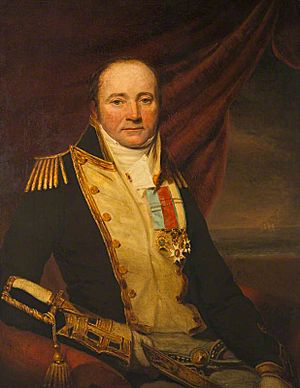Arthur Farquhar (Royal Navy officer, born 1772) facts for kids
Quick facts for kids
Sir Arthur Farquhar
|
|
|---|---|

Farquhar c.1837
|
|
| Born | 1772 Newhall, Scotland |
| Died | 2 October 1843 Aboyne, Scotland |
| Allegiance | United Kingdom of Great Britain and Ireland |
| Service/ |
|
| Years of service | 1787-1843 |
| Rank | Rear-Admiral |
| Commands held |
|
| Battles/wars | French Revolutionary Wars Napoleonic Wars |
| Awards | Knight Commander of the Royal Guelphic Order Companion of the Bath Knight of the Sword |
| Spouse(s) |
Jane Murray
(m. 1809) |
| Children | Sir Arthur Farquhar |
| Parents |
|
| Relatives | William Farquhar (brother) |
Sir Arthur Farquhar (1772 – 2 October 1843) was a brave officer in the British Royal Navy. He served during the French Revolutionary Wars and the Napoleonic Wars. He was known for his courage and leadership in many naval battles.
Contents
Arthur Farquhar was born in 1772 near Aberdeen, Scotland. He was the second youngest son of Robert Farquhar. His younger brother, William Farquhar, later helped start the modern city of Singapore.
Arthur joined the navy in 1787 when he was about 15 years old. He served on ships like the HMS Lowestoffe. After gaining experience, he even worked on a ship for the East India Company.
When the French Revolutionary Wars began, he quickly returned to naval service. In April 1798, he was promoted to lieutenant. He served on various ships in different parts of the world.
Courage in Battle
In January 1804, Farquhar was given command of the bomb vessel HMS Acheron. On 4 February 1805, his ship and another, the sloop HMS Arrow, were protecting a group of merchant ships. They were attacked by two large French frigates, Incorruptible and Hortense.
Farquhar and his crew fought bravely against the much larger French ships. Even though they were captured, a special navy court praised their defense. The court said their actions were "highly praiseworthy and deserving imitation."
The president of the court, Sir Richard Bickerton, 1st Baronet, told Farquhar he hoped he would soon command a ship where he could fight on equal terms. He added that the fight might not have been profitable, but it was very honorable.
A few days later, on 8 April, Farquhar was promoted to post-captain. He also received a special sword worth £100 from the Patriotic Fund. Merchants from Malta gave him a silver plate and a thank you letter.
From 1806 to 1809, Farquhar commanded the 20-gun HMS Ariadne. He served in the Baltic Sea and North Sea, capturing several enemy privateer ships. These were private ships that were allowed to attack enemy merchant ships.
From 1809 to 1814, he commanded the frigate HMS Desiree in the North Sea. During this time, he captured many privateers, gunboats, and armed vessels. He was the senior naval officer in important operations in the Weser, Ems, and Elbe rivers in 1813. These operations led to the capture of Glückstadt on 5 January 1814.
For his important services, Farquhar was honored by Sweden and received the Order of the Sword. He also received the Royal Guelphic Order. In 1815, he was made a Companion of the Bath. In September 1817, he was given the freedom of Aberdeen.
Later Commands and Recognition
From May 1814 to April 1816, he commanded the 40-gun HMS Liverpool at the Cape of Good Hope. Later, from 1830 to 1833, he commanded HMS Blanche in the West Indies.
During his time in the West Indies, he helped maintain order during a difficult period known as the Baptist War. For his efforts, he received a vote of thanks from the House of Assembly of Jamaica. He also received a sword valued at £150 and a silver plate from local merchants.
When he returned home, he was knighted. In 1832, he was made a Knight Commander of the Royal Guelphic Order. He became a rear-admiral in 1837. Sir Arthur Farquhar passed away at his home in Aberdeenshire on 2 October 1843.
See Also
Images for kids
 | Stephanie Wilson |
 | Charles Bolden |
 | Ronald McNair |
 | Frederick D. Gregory |


